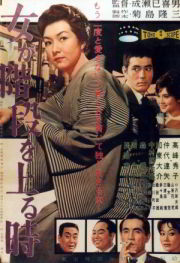 Our film club’s choice for this June is Mikio Naruse‘s 1960 film When a Woman Ascends the Stairs (女が階段を上る時, Onna ga kaidan o agaru toki).
Our film club’s choice for this June is Mikio Naruse‘s 1960 film When a Woman Ascends the Stairs (女が階段を上る時, Onna ga kaidan o agaru toki).
As we have noted before, Naruse has long been less well known in the west than his contemporaries Ozu, Mizoguchi or Kurosawa. However, with digitally restored releases in recent years from the British Film Institute, Eureka and Criterion, the director’s works have now become more widely available for English speaking audiences. Also, in addition to the film releases Naruse’s works have furthermore been promoted by Catherine Russell’s book The Cinema of Mikio Naruse, which I believe was the first and is still the only full length study on Naruse’s films available in English.
When a Woman Ascends the Stairs is usually celebrated as one of Naruse’s best works, and indeed as one of the best Japanese films of all time. As is typical for Naruse, it is on the surface a fairly quiet and subdued story of a woman, in this case a nightclub hostess trying to decide on a direction for her life while navigating in a strongly male dominated world. However, the restrained and almost soothing quality of the film hides fairly complex and contemplative social commentary. As Kurosawa reportedly once described Naruse’s style, it is “like a great river with a calm surface and a raging current in its depths”. As is often the case with Naruse, the style of When a Woman Ascends the Stairs can be compared to Ozu, while the film’s subject matter warrants comparisons with Mizoguchi.
For anyone familiar with Kurosawa’s works, When a Woman Ascends the Stairs is an interesting film to watch also for the number of familiar faces that appear on screen. Tatsuya Nakadai and Daisuke Katoo are immediately recognizable, while Masayuki Mori (Iwabuchi in The Bad Sleep Well, the husband in Rashomon and the titular character in The Idiot) gives yet another strong performance as the protagonist’s love interest. Ganjiroo Nakamura, Reiko Dan, Eitaroo Ozawa and Keiko Awaji have likewise all appeared in Kurosawa’s films. It is very interesting to note the differences between these actors’ performances here when they worked for Kurosawa.
The film’s leading actor (and interestingly also costume designer) Hideko Takamine should be a similarly familiar face for most of us. We have already seen her in Ozu’s Tokyo Chorus, Keisuke Kinoshita’s Twenty-Four Eyes and Naruse’s Flowing, which have all been in the film club schedule. And while Takamine never appeared in Kurosawa’s films, the paths of the two did cross a few times during Kurosawa’s early career as an assistant director.
Another more than familiar name that can be found in the film’s credits is Kurosawa’s regular co-writer Ryuuzoo Kikushima, who wrote When a Woman Ascends the Stairs. He additionally worked as the producer of the film, marking his first time in that role. After When a Woman Ascends the Stairs, Kikushima went on to produce five other films, four of which were Kurosawa’s.
When a Woman Ascends the Stairs is available as a Criterion release in the US, and a BFI release for European viewers.
And as always, a brief reminder of what is to come next: In July, we will continue with Kurosawa’s chronology, and take a look at Yojimbo. The full film club schedule can be found from the film club page.






Quick off the mark as usual Vili! An excellent summary. I watched the film a year ago and I was deeply impressed, as I usually am with Naruse. I’ll have my second viewing tonight.